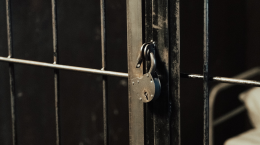Monitoring the status of “malicious violators” (“zlostniki”) in Belarusian prisons for minors prisoners-328
This monitoring is devoted to the status of “malicious violators” (zlostniki) for some prisoners in Belarusian prisons. “Malicious violators” are those who were formally accused of “grave violations of prison rules”, usually two or more times. The ways these accusations are made and how the status of a malicious violator affects one’s life in prison exemplify a flagrant violation of human rights in prison. This monitoring is based on the information obtained by surveys and interviews of 36 mothers of minors imprisoned under article 328. All the surveys were conducted individually, and the monitoring contains information confirmed by the vast majority of mothers of minor prisoners.
The status of a malicious violator has far-reaching consequences for the prisoner. For example, a malicious violator does not qualify for an amnesty. In this connection, having learned about the planned amnesty this year, prison administrations began to assign en mass the status of a malicious violator for any minor offences, and even without offences whatsoever. As a result, a great many minors under 328 did not qualify for the amnesty this year (almost nobody was pardoned).
A malicious violator is also not eligible for conditional release. There exists the possibility of conditional release as a reward for good behaviour if the prisoner has served a third of his sentence in prison. Malicious violators are deprived of this right and are doomed to serve their terms in prison in full.
There are other consequences of having the status of a malicious violator. The prison administration can deprive the malicious violator of visits with relatives, prohibit passing him parcels and even put him in a disciplinary cell for quite a long time.
Chapter 1. How and why minor prisoners become malicious violators in colonies
Chapter 2. Examples of imprisoned minors who have has the status of “malicious violators”
Chapter 1. How and why minor prisoners become malicious violators in colonies.
A person who is 14 or older can be arrested for a crime. Minors are usually arrested when they are at the age of 16-17, and most of them under article 328 CC (‘drugs issues article”). As a rule, when they are detained, the suspect is placed in a pre-trial detention centre (hereinafter SIZO) and kept there until trial. The detention can last quite a long time; on average, suspects spend there more than six months. But there were instances when minors were kept in pre-trial centres for 11-12 months, and even more than two years.
By the time of trial and announcing a sentence, the minor may already turn 18, in which case he is immediately sent to an adult correctional colony (hereinafter CC). If at the time of the verdict he is still minor, then he is sent to children‘s educational colony (hereinafter EC), where he is until he turns 21. Bobruisk educational colony for minors No. 2 serves as the children’s educational colony. In the children’s educational colony, the prison administration sometimes makes an exception and retains a young convict until he turns 23.
When a minor gets in the children’s EC and has a long sentence (8-12 years), which is usually under article 328 CC (“drugs issues article”), he is informed about the statutory rules of conduct in this institution. Besides, unfortunately, there are also informal, non-statutory (criminal) rules, which are well known both to convicted children and all the employees of the colony. Moreover, these criminal rules are encouraged by prison employees better to control minor prisoners.
A young prisoner is told that with such a long sentence (for example 8-12 years) he will not be able to serve in the children’s EC until the end of the term, and when he reaches the age of maturity (18 years), he will have to go to an ordinary “adult” prison. Moreover, it is recommended to get to an adult CC on one’s own, as the administration does not want to deal with it. But in order to do this, there is only one way – by means of committing “malicious” violations and getting them recorded in one’s personal file. A prisoner needs to commit at least two violations; then a “local trial” in the colony is held and the part of the sentence where the place of serving the sentence is indicated is changed. As a result, as the place of serving the term an adult CC is indicated, which is justified by reference to the convict’s bad behaviour.
Children sometimes ask “educators” of a juvenile colony: “Please, register at least some kind of violation so that I can be sent to an adult CC.”
Why do children themselves seek at any cost to be sent an adult colony? In the colony for minors, there is very cruel prison (criminal) culture, which, let us repeat, is encouraged by the prison administration. We will provide you with some examples of criminal rules in the colony for minors. For example, if the mother of a minor arrives in a red sweater or red dress, the minor has to refuse to go to her. He can cry, protest but it will not work: there are too high risks that he will be beaten up or even raped by other minors for communicating with a person in red clothes. For stealing cigarettes, or even if there is just a suspicion of theft, other minors can beat to death with bowls for food, if the prison administration does not intervene. In addition, convicts have almost no free time in a children’s colony, and labour requirements can (and often are) tougher than those in an adult colony.
Adult colonies also have their own criminal laws, but they are milder. Besides, the young convict, who failed to get out of a children’s colony himself, and stayed there until he his 21 or 23 years, is not welcomed by adult prisoners. He will be a pariah there, he will be treated badly and disrespectfully, perceived as an “activist” (informer and collaborator with the prison administration).
Thus, minor children, convicted for the first time and placed in the criminal environment, are forced to obey these criminal laws in order to survive, not be beaten up and have no risk of rape.
In an adult CC, minors, as a rule, become “malicious violators” for one of the following reasons:
– Failure to comply with dressing discipline (a button is not buttoned, a lace on a shoe is untied, the jumpsuit is mangled).
– Appearance does not correspond to that provided in the Statute (not shaved smoothly, the prison administration does not like your haircut).
– Failure to meet one’s quota of work. At the same time, it is often impossible to meet it as there is no material for work.
– There is a mess of personal belongings in one’s bedside table (this is done intentionally: when a colony employee wants to forge a violation for a prisoner, he just turns all the belongings over and imposes on the prisoner a penalty for the mess).
– If a prisoner answered or turned to a colony workers in a way not corresponding to the colony’s Statute (they often write in reports that a prisoner raised his voice – this might not be true, but it is impossible to prove the opposite).
– Smoking in a wrong place. Sometimes this means that the smoker was a step away from the place of smoking; he could not get within the “line” of the area of smoking, because it is too small and he cannot get there without pushing other people.
– Sleep in the daytime. A convict may lie down because of feeling unwell.
– Refusal to go to the dining room due to poor health.
– If a prisoner is outside his sector without a signed permission.
– If one’s bed is not made perfectly, or, the pillow is not leaning appropriately.
– If the prisoner did not go to social events (lectures on crime prevention, club).
These are the examples of the most frequent violations that are applied to convicts, especially those sentenced under article 328 of the Criminal Code of Belarus as a result of biased trials.
After committing three such violations, the convict acquires the status of a “malicious” violator. Accordingly, he does not qualify for an amnesty or being released under parole or changing the prison regime. Besides, after three violations, the prisoner, in addition to the status of a “malicious violator”, is deprived of either food parcels or a long meeting, which already are rare.
This status is removed only after one year from the date of a last violation and only if the prisoner has not committed a new violation during this year. It is almost impossible to remove it, because for a whole year, prison employees will for sure record at least one comment in order to artificially maintain the status of a “malicious person”.
It turns out that the prison administration, applying such simple actions, keeps convicts imprisoned until the end of their terms, thereby receiving slave labour and depriving the convicts of the possibility of an early release.
In addition, it is worth noting that despite our many requests, the prison administration refuses to issue a written document confirming the assignment of “maliciousness” to minor prisoners under 328. This, in our opinion, indicates that the administration is well aware of the fact that this status is assigned to prisoners under 328 illegally and with numerous violations. Lack of documentation makes it impossible to file a complaint about the status of “maliciousness” to other instances, and vicious practices perpetuate.
Chapter 2. Examples of minors who have been received the status of “malicious violator”
Artyom Gorbach (17 years old at the time of detention)
-
In January 2018
Two violations in EC-2 committed to provoke sending him to an adult colony; as a result, he was also prohibited to receive food parcels.
-
In March-April 2018
One violation: after a wakeup in the morning he was making his bed when a colony employee came in and imposed penalties on everyone who was in the room.
-
In March 2019
One violation: as he felt bad, he lay down on the bed and fell asleep during the daytime.
Maxim Zamorsky (17 years old at the time of detention)
In EC, he committed two violations to provoke sending him to a CC:
1) In February, 2015, he smoked outside the smoking area.
2) In March, 2015, he failed to shave and was absent from the dining room (in fact, he had a stomachache and it was painful for him to walk).
In CC:
1) In March, 2018, the administration gave him a permission to see his mother in March. Appropriate preparations were made, in part, his mother changed her work schedule. But the administration suddenly postponed the date to April, which provoked a conflict with Maxim. The convict tried to restore justice, because it would be problematic for the mother to change the work schedule again, besides, foodstuff was purchased for transfer. Maxim talked in a raised voice, which was a violation.
2) He made a sharpening device for cutting food (the prison administration does not allow to slice foodstuff). As it happened, in connection with an attack on an administration worker in CC-17 (a controller) by another convicted person (Vladislav Kazakevich) there was a general “shmon” (search) in all the colonies for “sharpening devices”. Vladislav Kazakevich was imprisoned because he cut off the head of a female seller with a chainsaw (at the time of the murder he wore a clown costume). There are many symptoms indicating that this guy was mentally ill and needed urgent hospitalization. But everyone suffered.
Emil Ostrovko (17 years old at the time of detention)
Violations in an EC to provoke sending him to a CC:
1) In February, 2019, he did not shave face in due time.
2) On March 29, 2019, he worked without protective glasses.
3) On April, 09, 2019, he was in a smoking area without a badge of an established type.
Oleg Leonchik (17 years old at the time of detention)
In August 2018, he did not go to the dining room as he felt bad. He was immediately put into the penalty isolator (ShIZO) for 10 days.
In May, 2019, he did not go to the club because of poor health.
Gleb Khalipov (17 years old at the time of detention)
He committed violations to provoke sending him from EC to CC.
In December 2017, for storing prohibited things (details are not known, but we know that he took a key from a room without permission), he was put into the disciplinary isolator for 7 days, including the New Year holidays!
In July 2018, at the insistence of an operative he owned the responsibility for making and keeping playing cards. As a result, he was deprived of the right to receive parcels. Besides, he was placed on the prevention register, which makes it impossible to have any bonuses.
Andrei Yakovchik (17 years old at the time of detention)
In January – December, 2018, he was punished for untidy appearance, failure to obey the bidding “lights out”. Non-statutory way of talking to a colony employee.
In January – April, 2019, non-compliance with the form of clothing, non-statutory way of talking. Smoking in a wrong place.









